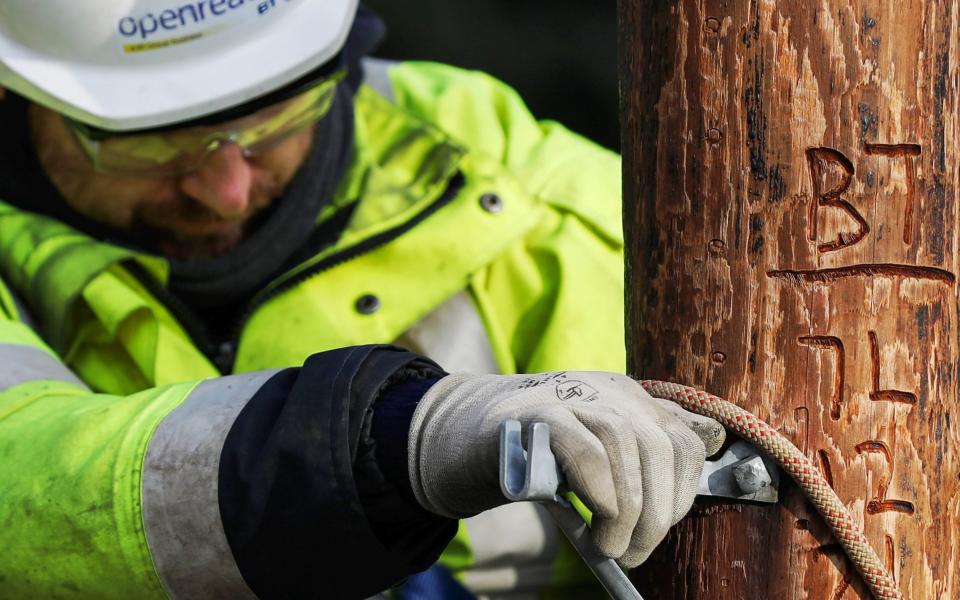BT relaunches controversial digital landline roll out that left customers unable to call 999

BT has relaunched its controversial digital phones rollout which left vulnerable costumes unable to dial 999, despite lingering concerns about the technology.
BT and other providers are in the process of replacing traditional landline phones with new “voice over internet” phones that make calls using broadband by 2025, as decades-old copper line networks have become too complex to manage.
The controversial rollout, which will result in the end of the traditional landline, was halted after it emerged vulnerable customers using the new phones were left unable to dial 999 during stormy weather last year after their internet went down.
Concerns were also raised that older burglars and health pendant panic alarms, which utilise landline technology, would no longer work once the new digital phones were installed.
BT said at the time it would look into developing more powerful backup battery packs designed to keep the digital phones going even in a power outage.
It also said it would work on other options such as the development of hybrid phones, which could work over the internet but also incorporate elements such as satellite technology as a failsafe.
But the rollout will now restart on a regional basis. BT said: “From this week, we will be contacting all full fibre and a smaller group of broadband customers yet to switch to ‘Digital Voice’.
“From the summer, customers will be encouraged to make the switch on a region-by-region basis.”
After a six-month consultation period with charities, consumer watchdogs, and government representatives, the provider has agreed to avoid proactively switching 1.5 million customers identified as vulnerable.
This includes those over 70, as well as those who only use landlines, have no mobile signal, or who have a healthcare pendant.
Yet campaigners still have concerns whether the issues that led to the rollout being halted in the first place will actually be ironed out in the long term.
Dennis Reed, of charity Silver Voices, said: “To be fair to BT they realised their mistake – they held their hands up and admitted they had gone too far too fast.
He added: “We need to make sure whatever systems people use for personal safety work properly – that’s got to be sorted out.
“We’re satisfied with the safeguards and the delay in switching people over to broadband, but BT needs to deliver on the promises made about these new systems.
“If I get a complaint about older people being pressured into switching over, I will take it up with BT vigorously.”
Caroline Abrahams, of the charity Age UK, said: “Home phones are a lifeline for older people who don’t use computers, don’t use a mobile, or live in a rural or coastal area with poor connectivity at the best of times so it’s is important that the switchover to digital phones is carried out carefully.”
However, Ms Abrahams warned that “all older people will need to be included in the programme later on,” adding: “We will be monitoring progress carefully.”

TV presenter Dame Esther Rantzen, who campaigned against the rollout, said copper landlines were “literally a lifeline” for older people.
She added: “The only way vulnerable BT customers, who are often older or disabled, can be protected from being completely isolated is if BT knows who and where they are, and has taken extra care to ensure their safety.
“Otherwise their burglar alarms may not work, their families may not be able to stay in touch, 999 calls may be out of reach.”
From the summer, BT said, customers in the East Midlands, Yorkshire, and Northern Ireland will be encouraged to make the switch.
Customers who are “ready and keen” can contact the provider to be transferred. In total 10 million customers will be switched by 2025.
More than 99pc of phone handsets are compatible with BT’s digital phone service, the provider said, adding that customers will be contacted four weeks before being upgraded.
A BT spokesman said it had overhauled its communications with its elderly customers, who will be able to nominate a family member, friend or carer to help them through the switch.
The provider has also announced plans to “digitally upskill” older customers through a partnership with AbilityNet, a charity.
A BT spokesman said existing customers with additional needs such as health pendants, or those without mobile coverage at home, will also be able to take advantage of free additional support, such as free battery backup units, engineer-supported installations or hybrid landline phones.
Customers with such needs are advised to contact their provider as soon as possible.

 Yahoo Finance
Yahoo Finance 